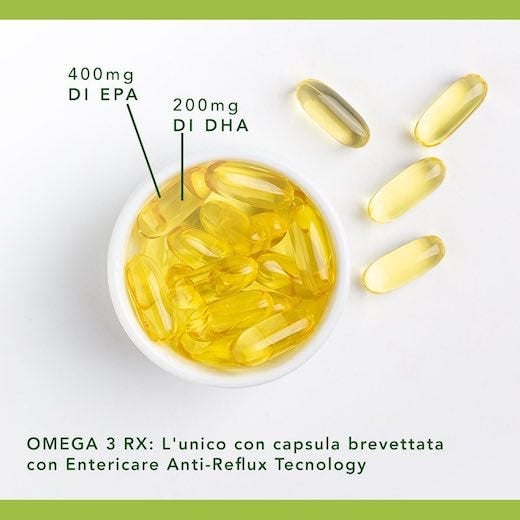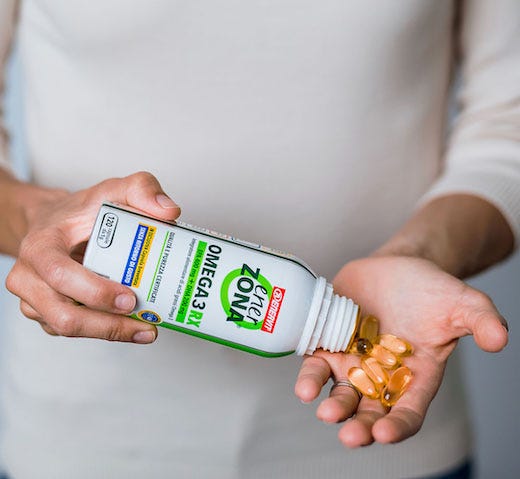OMEGA-3 FATTY ACIDS: WHAT ARE THEY AND WHAT ARE THEY ARE FOR?
by Elena Casiraghi, PhD, Equipe Enervit
To fully understand the importance of omega-3 fatty acids, let's immediately clarify a key concept. There are substances that the body can’t synthesize on its own. So, to "compensate," it has to take these substances through the diet. Omega-3’s belong in this category and if they could show us an ID card, it would look like this: omega-3 long chain essential polyunsaturated fatty acids.
Among omega-3 fatty acids are two that deserve attention because they are fundamental to the body’s wellbeing: EPA and DHA.


EPA
This is the acronym for eicosapentaenoic acid. In a nutshell, it has the task of regulating the balance of eicosanoids. As true signal mediators, these hormone-like substances gather useful "information" so that the cell itself responds appropriately to any change in the surrounding environment.
DHA
This is the acronym for docosahexaenoic acid. It’s the main structural component of the brain. Its intake has a positive effect on brain function and nerve tissue.
WHAT IS OMEGA-3 GOOD FOR?
According to EFSA (European Food Safety Authority):
- Omega-3 EPA (eicosapentaenoic acid) and DHA (docosahexaenoic acid) contribute to normal heart function, maintenance of normal blood triglyceride levels, and maintenance of normal blood pressure.
- Omega-3 DHA helps maintain good brain function and contributes to the maintenance of good vision.
So just to sum up, all benefits include:
- normal heart function
- normal blood triglyceride levels
- normal blood pressure
- good brain function
- good vision


WHAT FOODS ARE THEY FOUND IN?
Long-chain omega-3 fatty acids are mainly found in marine sources, specifically in fish. Cold water fish in particular seem to have a high concentration of them.
The recommended daily requirement for omega-3 is 2.5 g per day. In practice for example, this is equivalent to 400 g of salmon or 250 g of sardines or 1 kg of tuna or 3 kg of lobster per day. However, it’s good to keep in mind that the EFSA, the European Food Safety Authority, suggests a limit of 350 g of fish per week in order to avoid the significant intake of metals and toxic substances which, unfortunately, are abundant in our seas. Clearly, the math doesn't add up!
HOW TO CHOOSE AN OMEGA-3 SUPPLEMENT
Omega-3 fatty acids are essential for the psychophysical well-being of our bodies. This is information that we have learned and claimed as our own. However, what we still don't know in depth is how to choose a supplement based on omega-3 fatty acids.
The first piece of information to pay attention to is that the ratio of EPA and DHA – the two fatty acids that make up long-chain omega-3’s, must be 2:1. EPA must be present at twice the concentration of DHA.
Next, we must aim to choose the highest level of purity for this supplement. To help us in this arduous task, we are assisted by some organizations that certify product quality. First there is IFOS (International Fish Oil Standards Program), which graphically assigns five stars to the packaging of the product that bears its certification. This immediately identifies its quality. Next is Orivo, which guarantees that the supplement comes only from a certain controlled and protected territory. Lastly, Friend of The Sea certifies that the entire marine supply chain has been respected.
BUT THERE IS STILL ONE MORE THING TO KNOW
Opting for a certified and highly purified omega-3 supplement (RX level – the highest level of purity) with Entericare TM Technology, reduces any aftertaste while at the same time promotes optimal absorption of the supplement. The exclusive and patented technology that wraps the mixture contained in the capsules allows the contents to be released entirely in the intestine instead of at the gastric level.
If you are looking for a high-quality product to count on for your daily omega-3 consumption, choose EnerZona Omega3 RX. It gained all the above certifications and it’s the only one with the exclusive and patented capsule without aftertaste. Discover it here.






